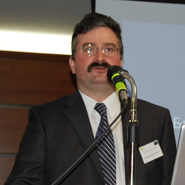Charlesworth will discuss how personal information posted on sites like Facebook, one of the largest social networks with 300 million users, can be accessed by a variety of organisations. He will discuss how information uploaded on sites like these may end up in the hands of unexpected and unwanted parties, and how the sites themselves are often cavalier with the security and privacy of their users’ information.
Charlesworth said: “People often treat internet communications and content as transient, but as data storage capacity has increased there’s much less pressure to discard data for efficiency reasons – consider the average person’s email inbox. Add to this an array of improved methods of data archiving and data mining, which permit the filtering of vast datasets for interesting associations and connections, and you have considerable incentives for organisations to try to retain individuals’ internet communications and content for as long as possible. Once this data is retained, there is no telling as to the uses to which it may be put.
“We’re often told that younger people are more relaxed about their personal information. To a point this may be true. After all, if you’re 18, you probably aren’t thinking about the impact of your current lifestyle choices upon your 42-year-old self looking for a job or promotion in what seems like the distant future. People don’t consider that long-term risk. I think this could become a serious problem in future.”
For example, researchers at the University of Dayton, USA, surveyed 5,000 employers nationwide and found that 40 per cent of employers would consider using the Facebook profile of a potential employee in making a hiring decision and 23 per cent of employers actively sought out candidates’ profiles on social networking sites.
Charlesworth continued: “People should consider what information they are disclosing about themselves and to whom. Even if you think you have secured your pages on sites like Facebook, there are many other routes through which you may be releasing more information than you intended – think about what someone might make of your Google searches or how behavioural marketers might use information captured by your internet service provider about the web pages you visit.
”People also need to be more vigilant about what social networking organisations do with their personal information. They should be prepared to object if they feel that they are being misled about how that information is used, and where it goes, or if they feel pressured into disclosing more information than they want to. The boundaries of what is acceptable should not be determined by default, and without debate, behind closed doors.
“I think social networking privacy policies and practices often represent a cynical spin on an old joke: ‘the secrets to a successful privacy policy are transparency and accountability. Once you can fake those, you’ve got it made’. “
The public talk entitled 'Who’s watching you?’ is being held from 6 pm to 7.30 pm on Wednesday 28 October at The Folk House, 40a Park Street, Bristol, BS1 5JG. Admission is free, but places must be booked in advance by contacting Margery Lever, Public Engagement Administrator, Centre for Public Engagement, University of Bristol, tel 0117 331 8313, or by visiting the Centre's website.

